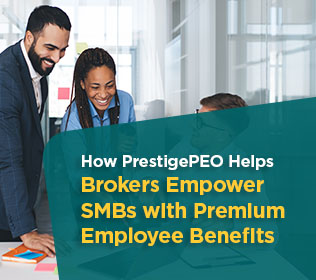
A focus on employee retention is driving employee benefits trends in 2024. Small and medium-size business (SMB) owners are seeing employees demand more choices and flexibility in their work lives, including their benefits. This blog will dive into current employee benefits trends and how advisors can help their SMB clients build and personalize benefit packages and leverage them for success in the coming year.
Whole Person Healthcare
Whole person healthcare expands the purview of healthcare to include areas that contribute to overall wellness, such as physical, mental, and financial well-being. Helping your clients create access to whole person healthcare for their employees isn’t just a matter of obligation. It’s also a strategic element in protecting and enhancing revenue, as mental and physical health is linked directly to work engagement.
A 2023 Gallup survey collected data on employee perceptions of how much the organizations they work for care about their well-being. Employees who strongly agree that their employer cares about their overall well-being, in comparison to others, are:
69%
less likely to actively search for a new job
71%
less likely to report experiencing a lot of burnout
3x
more likely to be engaged at work
5x
more likely to strongly advocate for their company as a place to work and to trust the leadership of their organization
36%
more likely to be thriving in their overall lives
As a benefits consultant, you are able to connect your SMB client with employee offerings that will help them remain a desirable employer to job seekers while meeting their current workforce’s needs.
Let’s take a look at three important aspects of whole person healthcare and the employee benefits that build security for the employee and trust for the employer: comprehensive healthcare plans, improved access to mental healthcare, and financial wellness benefits.
Comprehensive Healthcare Plans
Your SMB client may be among the many employers who are prioritizing making healthcare benefits affordable to employees to stay competitive in the labor market.
According to a recent report, Health & Benefits Strategies for 2024, employers continue to prioritize competitive health benefits and avoid exorbitant cost shifting to employees. Here are some strategies employers are using to enhance healthcare affordability for their employees this year:
64%
of employers plan to make enhancements to their health and well-being benefits
15%
of employers offer free employee-only coverage in at least one medical plan
18%
of employers use salary-based contributions to increase affordability
39%
offer medical plans with no/low deductibles, removing financial barriers to seeking care
5%
make larger HSA contributions to low earners
PEO partnership enhances a benefits consultant’s portfolio with a wide array of low-cost, high-value benefits. In this way, brokers can work with their SMB clients to customize a comprehensive healthcare plan that works for their workforce and their budget.
Ancillary and Voluntary Benefits Close Gaps
Employers are increasingly offering ancillary and voluntary benefits that add value to and expand the scope of their core benefits offerings. These can range from dental and vision coverage to benefits for family-building, reproductive care, or mental health services.
Add-on health coverage addresses the gap in healthcare affordability and advances health equity in the workplace. Greater access to essential care has a major impact on the health, well-being and quality of life for both employer and employee.
You can find more information about the value ancillary and voluntary benefits provide to benefits consultants and their clients by visiting our broker blog archive.
Savings Plans Lower Barriers to Care
Small and medium-size business owners in particular are contributing to savings accounts to reduce cost sharing amounts for employees who are enrolled in plans with high deductibles. As a benefits consultant, you can help them lower the financial barrier to care with a Flexible Spending Account (FSA) or a Health Savings Account (HSA). Both of these ancillary benefits help your client’s employees save for qualified medical expenses.
Here is a quick rundown on the differences between two common health accounts employers can offer:
Health Savings Accounts (HSAs)
- This type of investment account is only available to those enrolled in a High Deductible Health Plan (HDHP)
- An HDHP credits a portion of the plan premium to the HSA
- HSAs are eligible for pre-tax contributions
- Funds from this type of account can be used to pay for plan deductible and/or qualified medical expenses that don’t count toward the deductible
- These accounts earn interest and remaining balances can be rolled over year to year
- HSA funds can be kept if the insurance plan changes, or the account holder retires
Flexible Spending Accounts (FSAs)
- An FSA allows enrollees to set aside pre-tax money for healthcare and dependent care expenses
- There are three types of FSA accounts that may be available to your client
- Health Care FSA (HCFSA)
- Limited Expense Health Care FSA (LEX HCFSA)
- Dependent Care FSA (DCFSA)
- Full-year election amounts for FSAs are split into smaller payments and deposited directly into an FSA from each of the enrollee’s paycheck
Click here to learn more about the differences between FSA, HSA, and DCFSA accounts.

Improved Access to Mental Healthcare
SMB owners are on the lookout for additional solutions to alleviate their employees’ stress. One of the most impactful ways to help your clients increase employee satisfaction, productivity, and quality of life: improved access to mental healthcare.
Mental health has significantly declined since the start of the pandemic and has not yet recovered. Even though emerging from a global crisis did alleviate some workers’ acute symptoms of poor mental health, other stressors intensified at the social, cultural, and economic levels. Among others, these were directly linked to the workplace, such as layoffs, income inequality, forced returns to office, and growing tensions between employers and workers.
The Business Group on Health reported that depression is at record highs, but employers are implementing effective, research-backed resources that can help their employees flourish. Some of the most recent include:
- Employee assistance programs
- Enhanced in-network options for mental health specialists
- Access to substance use disorder services
- Mental health literacy programs
- Cognitive behavioral therapy for stress, anxiety, and depression
- Access to wellness apps that can help improve meditation, eating, and sleep habits
Data from the Principal Financial Well-Being Index found that the mental health of 67% of surveyed employees is negatively impacted by concerns about the economy and their financial security. A link has been found between financial and mental health, which may be a contributor to heightened attention on another one of 2024’s tending benefits: financial wellness programs and education.

Financial Wellness Benefits
Persistent inflation has pushed more Americans to live paycheck to paycheck, cut back on expenses, dip into their savings and stop contributing to their retirement accounts. Your SMB client’s employees will be looking to them now more than ever for financial assistance. Though 2023’s salary raises were some of the highest in years, they did not significantly reduce employees’ financial stress due to continued increases in costs of living.
Ensuring pay increases meet or exceed inflation is important for your clients’ retention rates, but to demonstrate differentiation in the labor market, they may want to consider adding one or more of the financial well-being offerings that are growing in popularity among job seekers. These can include financial counseling, tax preparation services, and other financial wellness programs.
Highly competitive employers may also offer financial support to their employees such as support with student loan repayment, employer-assisted housing (EAH) programs, and next-level retirement planning.
Additionally, your client may be open to adding services that can help their workers save money for major and minor life events.
Lifestyle Savings Accounts
A growing number of employers are offering their employees Lifestyle Savings Accounts (LSAs). These help employees afford non-essential pursuits that enhance their overall quality of life. The funds in these accounts can be used to cover hobbies, well-being activities, travel, and more. A recent report found that about 13% of employers now include a lifestyle account in their employee offerings.
Retirement Plans
Retirement plans are non-negotiables for your SMB clients and their employees if they want to secure their financial futures. When your client includes retirement savings plans, they may be able to take advantage of additional perks such as business tax credits or deductions and an ROI by way of improved employee work ethic, productivity, and loyalty.
PEO brokers have access to a wider portfolio and can help their clients efficiently select the right plan for their small businesses. Retirement plans procured through a professional employer organization have the additional benefit of outsourcing the administrative requirements to the PEO, removing the need for your small and medium-sized business clients to take on another time-consuming burden.
Brokers should note that by the start of 2024, nearly 20 states in the U.S. have mandated programs to help workers save for retirement. In February, a bill was introduced to Congress that, if passed, will require employers to auto-enroll their workers in retirement plans. Enrolling small and medium-sized business clients in one of your PEO partners’ qualified retirement plans will ensure your clients are already prepared for and compliant with any forthcoming legislation.
Assistance with W2-Forms and Employer Taxes
Your clients can rely on your PEO partner to help employees take on the tax season with confidence. Resources such as employee-focused webinars can help SMB clients give their workers a way to locate their tax forms and understand their W-2s.
There is great value in working with a PEO. Professional employer organizations equip benefits consultants with options to enrich their clients’ benefits offerings. Brokers can create personalized packages with cost-saving options for comprehensive healthcare plans, mental health resources, and financial wellness programs. With the right PEO partnership, you can empower your clients for a successful year.
How to Help Small and Medium-Sized Business Owners Build the Right Benefits Strategy
In 2024, your SMB clients are looking to enhance their benefits offerings, but will rely on their benefits consultants to help them find the smartest ways to add value, not just novelty. To do this, you can help them identify ways to fill existing gaps in their current offerings with more inclusive benefits. Here are a few ways your clients can approach this task to ensure the most successful outcomes:
Have Your Client Use Employee Feedback to Tailor Benefits Offerings
- Evaluate high-utilization offerings that are already in place
- Have your client poll their employees to understand which benefits will serve them best
- Consider employee demographics and needs; these can vary widely from company to company
Go Digital for the Ideal Employer and Employee User Experience
PEO technology and software for management and administration offers your clients and their workers increased functionality, flexibility, and efficiency as they manage day-to-day activities. Top professional employer organizations like PrestigePEO create an avenue for your client’s employees to easily access payroll and benefits information through a centralized web-based portal. Your clients will be able to access these along with in-depth reports and employee records tools to enhance:
- Employee benefits enrollment and employee participation
- Benefits information and education
- Customized branding to feature your client’s company logo
- Robust and flexible security capabilities
- Assistance resources
Focus on Employee Support
The assistance resources you and your SMB clients receive, both through PEO software and client/employee support teams, can help guide employees through the complexities of health insurance and enrollment. They will also strengthen your client’s employee onboarding process and give their employees opportunities for skill-building and education courses. Additionally, the benefits support provided by a PEO significantly reduces a benefits consultant’s call volume.
Explore Collective Buying Power
Introduce your client to your PEO partner for large-group benefits at accessible prices. Pairing your expertise with the buying power of a professional employer organization gives your client a way to compete for top talent with perks and rewards that typically aren’t available to small and medium-sized business owners.
In addition to the yearly advantages of helping your client secure enhanced healthcare coverage at a lower cost and accessing a diverse portfolio of other benefits, your connection to a PEO makes employee benefits administration support available to your client year-round.
PrestigePEO is the partner you and your SMB clients need to help navigate the complex and evolving needs of the workforce in 2024. Partnering with us enhances your portfolio so you can deliver employee benefits that will help improve the employee experience for your client’s workers, create opportunities to achieve cost-savings for your client, and solidify you are the benefits consultant of choice for your book of business.
Get your clients connected with PrestigePEO and help them design custom packages packed with the employee benefits trends that improve employee retention and client satisfaction.
To learn more about how to start creating custom benefits packages for your clients and connect to resources like our HR and benefits experts, and more, contact us online or by phone at 888-PEO-PEO1.




